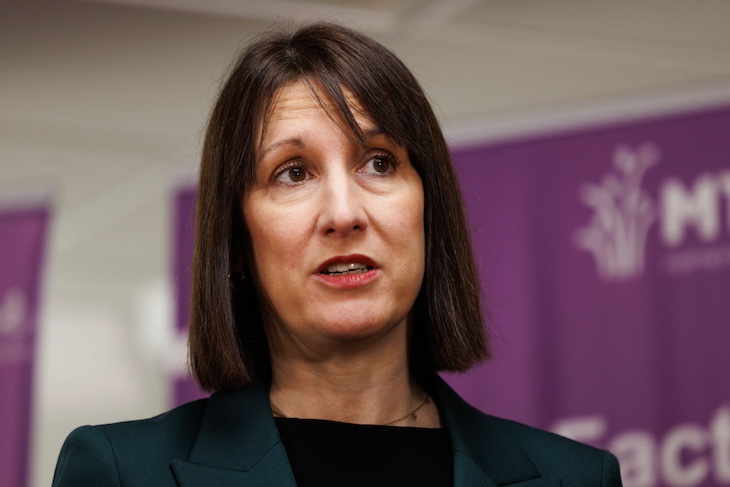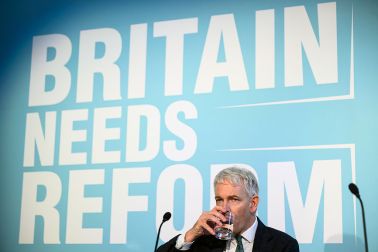The Chinese communist party claims to know a thing or two about humiliation – the ‘century of humiliation’ at the hands of rapacious foreigners is a founding myth of the CCP, which presents itself as a redemptive power. It will no doubt derive some satisfaction in making Rachel Reeves look foolish, as she heads to China today with a selection of City grandees. In reality though, the damage will be largely self-inflicted.
Starmer’s China strategy seems even more incoherent than that of his predecessors
For multiple reasons, the timing of a visit designed to build closer economic links with Beijing is awful. It comes just weeks after the UK confirmed the expulsion of an alleged spy who became a confidant and business partner of the Duke of York. It also comes just after Chinese cyber spies were accused of breaking into staff computers at the US Treasury, the latest in a hacking frenzy that in recent months has included the UK’s Electoral Commission and a Ministry of Defence payroll contractor.
And it comes amid mounting evidence of China’s burgeoning anti-western alliance with Russia, whose aggression in Ukraine would not be sustainable without Beijing’s economic support. A Chinese ship accused of severing fibre-optic cables in the Baltic Sea in collusion with Moscow was allowed to sail away by the Danish navy a few days before Christmas after Beijing refused to cooperate in an investigation.
Reeves has in tow the Bank of England governor, Andrew Bailey and the chief executive of the Financial Conduct Authority, Nikhil Rathi. In briefings ahead of the visit, officials suggested that talks with Chinese vice-premier He Lifeng could help boost trading of the Renminbi, the Chinese currency, in the City of London. Yet China’s goal is to undermine the dollar-based financial system, and any suggestion that London is pushing to facilitate that is remarkably tone deaf on the eve of the return of Donald Trump as US president, with his administration stacked with China hawks.
UK financial officials also want Beijing to give the go-ahead for Chinese online retailer Shein to list its shares in the UK. The potential £50 billion float would, they believe, be a big boost to the City of London and its beleaguered stock exchange. Shein’s initial plan had been to list in New York, but that was derailed over national security concerns, alleged links to forced labour and claims that Shein gains an unfair advantage due to customs law loopholes.
Earlier this week, a lawyer for Shein was accused by British members of parliament of ‘wilful ignorance’ after she repeatedly refused to say whether the company sells products containing cotton from the Xinjiang region in the northwest of China, where there have been well-founded allegations of forced labour and widespread human rights abuses. One MP called her evidence ‘ridiculous’. (Shein says that it is committed to human rights and has a zero-tolerance policy towards forced labour.)
Also accompanying Reeves is Mark Tucker, chairman of HSBC, which has faced criticism for endorsing Hong Kong’s draconian security law. Hundreds of pro-democracy activists have been prosecuted, including media tycoon Jimmy Lai, a British citizen, who was charged with conspiracy to collude with foreign forces and is expected to be sentenced later this month. The bank, which has extensive interests in China, froze the accounts of democracy activists, claiming it had no choice but to obey local laws. More recently it has reportedly lobbied for China not to be designated as a threat under a new foreign influence registration scheme – a designation that seems self-evident and would subject its activities in the UK to far closer scrutiny.
Reeve’s outreach to China seems to undermine her own government’s ‘audit’ of relations with Beijing. The audit, promised as a way of bringing ‘long-term and strategic approach to managing our relations’ began last August. It was expected to conclude this month, but this has reportedly been delayed until at least after Reeves’s visit, with only ‘some’ of its findings made public. Little is known about the mechanics of the audit, even by those who have been invited to give evidence. The process is proving almost as opaque as those of the Chinese communist party.
Reeve’s visit follows that of foreign secretary, David Lammy, and Keir Starmer’s face to face meeting with Chinese president Xi Jinping on the sidelines of November’s G20 summit in Rio de Janeiro. It also follows numerous moves to appease Beijing, including taking China’s planning application for a new mega-embassy in east London out of the hands of Tower Hamlets council (which has unanimously rejected it), and prevailing on former Taiwanese president Tsai Ing-wen to postpone a visit to the UK.
Reeves’s visit will supposedly herald the resumption of the UK-China Economic and Financial Dialogue (EFD), regular get-togethers introduced under Tony Blair’s government, but not held since 2019. It is not known who will sit on the opposite side of the table from Reeves, but it will not be Gao Shanwen, chief economist at state-owned SDIC Securities, who has been reportedly banned from speaking and is under investigation after criticising Xi’s economic management and suggesting growth figures have been inflated and are less than half the 5 per cent officially claimed.
China’s economy is faltering, and the downturn is worse than widely appreciated, which also makes the timing of Reeves’s cap-in-hand mission all the odder. Starmer is said to be facing the age-old challenge of balancing national security and human rights concerns, where he has promised to be vocal, against economic opportunity. But it is hard to identify times when the Labour party has been particularly vocal – Starmer has even been reticent in condemning the jailing of activists in Hong Kong. And China has never seen the distinction, using trade, investment and market access as means of coercion, and the creation of dependencies as a weapon. Starmer’s China strategy seems even more incoherent than that of his predecessors. He has characterised his approach as being ‘pragmatic’, but it seems little more than appeasement.
Kate Andrews, Katy Balls and James Heale discuss the most recent tranche of economic data – and bad news – for Rachel Reeves on the latest Coffee House Shots podcast:








Comments